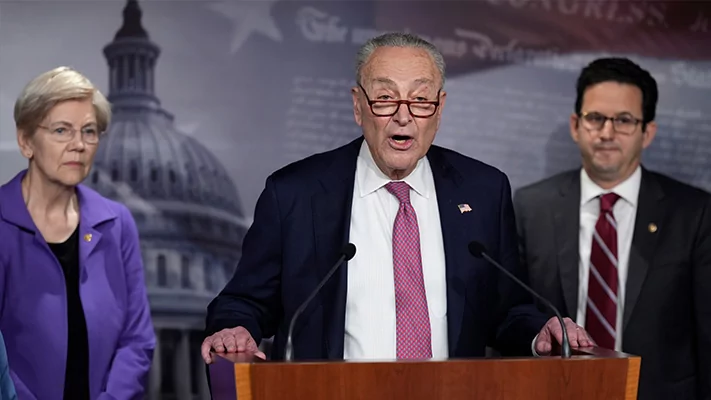Burgeoning disagreements among Senate Democrats regarding the conflict between Israel and Iran have presented themselves as the latest challenge facing Senate Minority Leader Chuck Schumer (D-NY).
The New York lawmaker has experienced declining popularity in his own caucus amid myriad challenges this year following devastating results for Democrats, including in the Senate, during the 2024 elections.
Israel’s recent attack on Iran has only served to intensify Schumer’s troubles. As someone who has embraced pro-Israel stances, he now faces divisions among his ranks on the country’s decision to attack Iran, as well as whether the United States should aid a war against the regime.
Schumer has remained silent on a war powers resolution that Sen. Tim Kaine (D-VA), a member of the Senate Armed Services and Foreign Relations Committee, introduced on Monday. The resolution would require congressional debate and a vote before the U.S. takes any offensive measures to help Israel fight against Iran.
And when Sen. Bernie Sanders (I-VT), who caucuses with Democrats, introduced a bill this week seeking to bar funding for military force against Iran, Schumer declined to sponsor it, despite backing the same legislation in previous years.
Despite Kiane and Sanders’s outspoken stance, Schumer has yet to offer a public statement on the conflict since Trump signaled that military involvement could be coming earlier this week. Senior members of his administration have also declined to rule out such options.
Schumer’s muted positioning over the past few days comes as his views on Israel differ sharply from members of his caucus, such as Sanders, making it difficult for the increasingly unpopular Senate minority leader to navigate politically as he seeks to hold on to power.
When Israeli Prime Minister Benjamin Netanyahu last week launched a series of strikes against Iran directed at destroying its nuclear program, ballistic missile capabilities, and military leadership, Schumer initially issued a strong statement affirming the Jewish nation’s right to defend itself from nuclear threats, while calling for diplomatic solutions to de-escalate the situation, similar to the Trump administration’s approach.
“The United States’ commitment to Israel’s security and defense must be ironclad as they prepare for Iran’s response,” he wrote.
“The Iranian regime’s stated policy has long been to destroy Israel and Jewish communities around the world. I have long said that Israel has a right to defend itself and that Iran cannot have a nuclear weapon,” the Senate’s Democratic leader continued.
Such language has already set Schumer up for likely conflicts with conference members such as Sanders, who said, “This attack was specifically designed to sabotage American diplomatic efforts: Israel assassinated the man overseeing Iran’s nuclear negotiating team, despite the fact that further talks with the United States were scheduled for Sunday. Whatever you think of the corrupt and authoritarian Iranian regime, this attack clearly violates international law and the United Nations Charter.”
Schumer’s latest troubles add to a trend of aging establishment figures falling out of favor with their colleagues and struggling to corral raucous liberal elements of the party.
Voters have also handed Schumer a searing report card as he seeks to lead the minority in the Senate, with an April poll of younger voters revealing just 23% approve of the job congressional Democrats were doing.
Amid the dismal numbers, the Senate leader faces a tough path in boosting Democrats’ power in the upper chamber ahead of the 2026 elections. An unfavorable 2026 Senate map could become even more challenging as Democratic incumbents keep retiring, with Sen. Dick Durbin (D-IL) continuing this trend in April.
After losing the majority in the Senate to the GOP last November and more recently acquiescing to Trump’s demands to move a key government spending bill forward, Schumer has faced calls to step down as leader. Some Democrats have proposed that Rep. Alexandria Ocasio-Cortez (D-NY) should challenge him for his Senate seat.

US MILITARY BOLSTERING MIDDLE EAST PRESENCE AMID ISRAEL-IRAN WAR
The turmoil in Schumer’s corner echoes chaos in national Democratic quarters and the dismal view voters across the country have of the party.
Intra-party struggles with David Hogg at the Democratic National Committee illustrate tensions between the progressive and establishment wings of the party, as well as growing calls for younger leadership as aging power players, including Schumer, grapple to retain authority. Earlier this year, the GOP took its largest-ever advantage over Democrats in favorability ratings. As Democrats shed support, particularly from male and Hispanic voters, another poll this spring put the party’s favorability rating at a record low of 29%.























